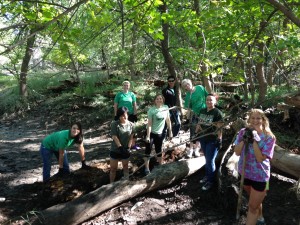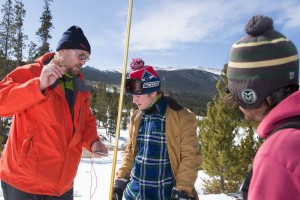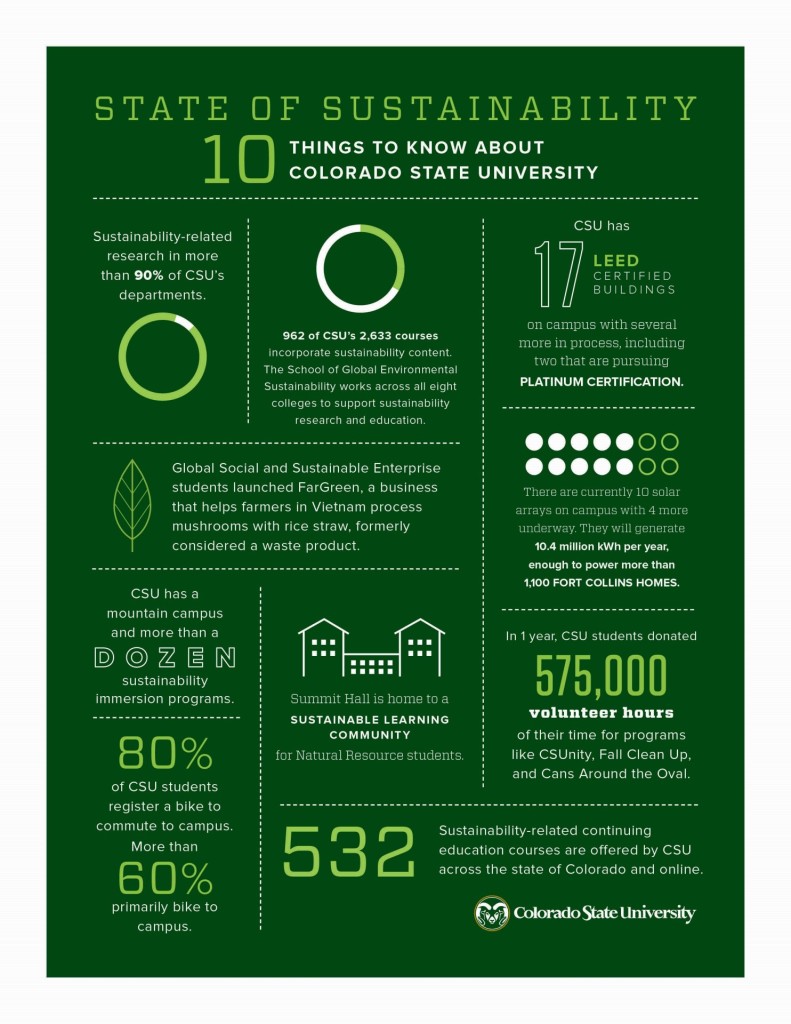Colorado State has a long history as one of the nation’s most sustainable universities, but now CSU is the first university in the world to ever have its sustainability efforts go platinum.
CSU has become the first and only campus to achieve platinum status – the highest possible – under the STARS rating system, an independent program that measures comprehensive sustainability efforts at more than 700 universities across the globe.
“This STARS rating reaffirms that CSU is a national leader in building a sustainable, environmentally responsible campus community,” President Tony Frank said. “That commitment to sustainability is woven through Colorado State’s academics, research, student engagement, operations, planning, and administration by the conscious efforts of our students, faculty and staff. There is no one office in charge of sustainability at Colorado State – it’s a collective effort of the entire community, and we’ve made progress because of the vision, hard work and tireless dedication of many, many people.”
STARS stands for Sustainability Tracking, Assessment & Rating System, and it is a program conducted by the Association for the Advancement of Sustainability in Higher Education. It is considered the most comprehensive and prestigious sustainability performance measurement program in higher education.
[row][paragraph_left]
Intensive review process
STARS looks at a lot more than whether a university uses solar power. The exhaustive process takes a comprehensive approach that examines academics, sustainability-related research, student engagement, transportation, operations, outreach programs and more.
Nearly 700 universities and colleges on six continents across the globe participate and are rated through the STARS system. This is the third time CSU has achieved the highest scores of all universities in the STARS rating.
CSU set high scores when it submitted its first report to STARS in 2011 and then again in 2014. Both scores earned CSU a STARS Gold rating.
“This accomplishment highlights the continuous improvement that comes as a result of participating in STARS to achieve campus sustainability goals,” said AASHE Executive Director Meghan Fay Zahniser. “Colorado State University has demonstrated a substantial commitment to sustainability by earning a STARS Platinum rating and is to be congratulated for its efforts.”
Commitment to sustainability
CSU’s strong commitment to sustainability in academics and research is evident in the report. The university offers 962 credit courses that[/paragraph_left][third_paragraph]
Facts about CSU’s Platinum rating
- CSU is the first and only university to ever receive a Platinum rating — the highest available — under STARS.
- To date, more than 700 institutions on six continents have participated in STARS ratings
- STARS defines sustainability as inclusive, encompassing environmental, economic, and diversity and social justice topics.
- STARS evaluates universities for their sustainability efforts across campus. Reporting is divided into four categories: academics and research; operations; engagement, and planning and administration.
- More facts about CSU’s STARS rating
[/third_paragraph][/row]

include sustainability as well as 532 non-credit continuing education courses that include sustainability across the state of Colorado and online. CSU earned maximum points for research with more than 90 percent of the academic departments on campus engaged in sustainability research and the School of Global Environmental Sustainability sponsoring Global Challenges Research Teams and Resident Fellows.
Campus engagement was another area where CSU earned maximum points in the report, with student initiatives like the Student Sustainability Center, Eco Leaders, and ASCSU Environmental Affairs among some of the highlighted programs.
CSU received credit for a broad spectrum of operations initiatives including the alternative transportation options available to faculty, staff and students, the Transfort and MAX bus systems and Around the Horn, an on-campus shuttle service; and for its Energy Reserve Fund, which pays for energy efficient upgrades in buildings. The savings from those upgrades are put back into the fund.
In addition, CSU’s Adult Learner and Veterans Services office and its Energy Institute and Powerhouse Energy Campus were identified as innovative programs in the report.
The ALVS office was recognized for its support of non-traditional students — GI Jobs magazine has consistently rated CSU as among the top military-friendly colleges and universities for the past five years. This is an example of the wide-ranging nature of the STARS definition of “sustainable,” and of CSU’s commitment to its wide range of students on campus.
The Energy Institute and Powerhouse Energy Campus were cited for the energy efficient features built into the North College Avenue facility and for the innovative research being conducted there.

“Colorado State University has a long history of outreach, research and academic programs focused on sustainability, many of which started long before sustainability was even a buzz word,” said Amy Parsons, CSU’s vice president for Operations. “The achievement of being named the first university to ever receive a STARS Platinum recognition for comprehensive commitment to sustainability – not just in research and teaching, but also in our commitment to infusing sustainability as a way of life on campus – is a credit to the efforts of hundreds of current and former faculty, staff and students who have embraced the concept of caring for and about our environment for many years. This recognition is due to the hard work of individuals from across campus, teaching and learning in all disciplines, and the relentless dedication of a small group of campus leaders who catalog and organize all of these efforts to achieve this rating.”
How ratings are determined
STARS reporting is divided into four categories: academics and research; operations; engagement, and planning and administration.
Schools submit the information and are awarded a rating – Bronze, Silver, Gold or Platinum – based on their score. For a Platinum submittal, AASHE personnel conduct a comprehensive review of all credits before the institution’s report has been submitted to ensure that content is consistent with STARS credit criteria and meets the intent of the STARS credit process.
CSU is the first university to pursue a Platinum rating from STARS. Most of the universities and colleges that have completed the comprehensive questionnaire have earned a Silver or Gold rating.
“We feel very fortunate at CSU to be the first institution to achieve a Platinum rating. There are 77 questions that require more than 1,000 unique answers and data points,” said Carol Dollard, an energy engineer and co-chair of the CSU President’s Sustainability Committee. “This report truly reflects the efforts of our entire campus community to not only promote and practice sustainability, but also track our successes in meaningful and measurable ways.”
“Land-grant education, field-based natural research, service, and experiential learning are the foundation on which CSU is building today’s innovative sustainability breakthroughs,” added Tonie Miyamoto, co-chair for the President’s Sustainability Committee and director of communications and sustainability for Housing & Dining Services. “Our students are constantly challenging us to do more to protect the planet and it is our responsibility, and our privilege, to give our students the tools and empowerment they need now to be stewards for future generations.”

Assets for Media
Print assets
High resolution images
State of Sustainability infographic
 CSU Eco Leaders, sustainability peer educators, assist with flood clean-up in 2013.
CSU Eco Leaders, sustainability peer educators, assist with flood clean-up in 2013.
 A CSU Ecosystem Science and Sustainability professor and students take snow survey measurements in the Cache la Poudre River basin, 2014.
A CSU Ecosystem Science and Sustainability professor and students take snow survey measurements in the Cache la Poudre River basin, 2014.
 Students in Professor Christopher Myrick’s Introduction to Fishery Biology class catch grass carp that have spent the summer in the CSU Lagoon. The carp are moved to a deeper pond for the winter.
Students in Professor Christopher Myrick’s Introduction to Fishery Biology class catch grass carp that have spent the summer in the CSU Lagoon. The carp are moved to a deeper pond for the winter.
Video
[row][paragraph_left] [/paragraph_left][third_paragraph] [/third_paragraph][/row]